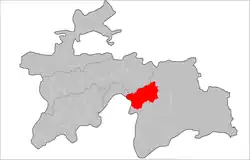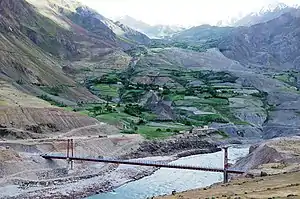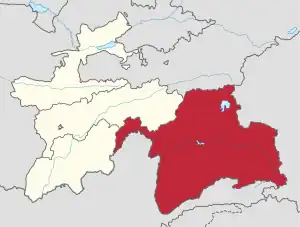Vanj District
Vanj District or Nahiya-e Vanj (Tajik: Ноҳияи Ванҷ) is a district in eastern Tajikistan, in the north-west of the Gorno-Badakhshan Autonomous Region, with administrative capital Vanj.
Vanj District
| |
|---|---|
 Location of Vanj District in Tajikistan | |
| Coordinates: 38°22′23″N 71°27′19″E | |
| Country | |
| Region | Gorno-Badakhshan Autonomous Region |
| Capital | Vanj |
| Area | |
| • Total | 4,430.5 km2 (1,710.6 sq mi) |
| Population (2020)[1] | |
| • Total | 34,400 |
| • Density | 7.8/km2 (20/sq mi) |
| Time zone | UTC+5 (TJT) |
| Postal code | 736300 |
| Area code | +992 3551 |
| Official languages | |
| Website | vanj |
It is located east of the river Panj at the point where the Panj turns from north to west. It is roughly rectangular, tending to the southwest. It is bounded on the west by the Panj and Afghanistan, on the northwest by Darvoz District, on the north by the Darvoz Range and Farkhor District of Khatlon Region, on the east (approximately) by the Academy of Sciences Range and Murghob District and on the south by the Yazgulem Range and Rushon District. It corresponds to the valleys of the rivers Vanj (north) and Yazgulem (south), separated by the Vanj Range.[3] The population of Vanj District is 34,400 (1 January 2020 estimate).[1]

Administrative divisions
The district has an area of about 4,400 km2 (2,000 sq mi) and is divided administratively into six jamoats.[4] They are as follows:[5]
| Jamoat | Population (Jan. 2015)[5] |
|---|---|
| Rovand | 6,663 |
| Tekharv | 3,926 |
| Vanj (Abulloev) | 11,217 |
| Vodkhud | 2,457 |
| Yazghulom | 6,215 |
| Zhovid | 3,862 |
References
- "Population of the Republic of Tajikistan as of 1 January 2020" (PDF) (in Russian). Statistics office of Tajikistan. Retrieved 3 October 2020.
- "КОНСТИТУЦИЯ РЕСПУБЛИКИ ТАДЖИКИСТАН". prokuratura.tj. Parliament of Tajikistan. Retrieved 9 January 2020.
- Republic of Tajikistan, map showing administrative division as of January 1, 2004, "Tojikkoinot" Cartographic Press, Dushanbe
- "Regions of the Republic of Tajikistan 2017" (PDF) (in Russian). Statistics office of Tajikistan. pp. 15–21. Retrieved 12 October 2020.
- Jamoat-level basic indicators, United Nations Development Programme in Tajikistan, accessed 7 October 2020
